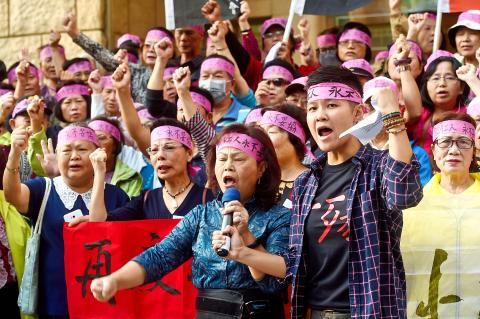The Taiwan High Court yesterday upheld a verdict ordering Radio Corp of America (RCA) and its affiliates to pay NT$718.4 million (US$23.7 million) to its former Taiwanese employees and their families.
Yesterday’s ruling increased the compensation from NT$564.45 million in the first ruling in 2015, with stakeholders closely watching the court’s decision in one of the nation’s longest-running legal battles between a major corporation and workers.
RCA, which operated several production plants in Taiwan from 1970 to 1992, was in 1986 taken over by General Electric Co (GE), which later sold it to Thomson Consumer Electronics, the US subsidiary of France-based Thomson Multimedia, which is now called Technicolor SA.

Photo: Chien Jung-fong, Taipei Times
The court included GE, Technicolor and Thomson as defendants, ordering them, along with RCA, to pay compensation to 486 former employees.
In the first ruling, the judges wrote that they were unable to determine whether RCA was a subsidiary of GE, based on RCA’s business registration, and omitted GE as a responsible party.
However, an investigation found that GE took over RCA before selling it to Thomson, which took ownership of an RCA production plant in then-Taoyuan County.
The judges ruled that GE was in control of RCA’s operations in Taiwan during the period in which the workers said chemicals from the plants caused them to develop cancer and other illnesses.
While the plaintiffs were comprised of 486 former employees, yesterday’s ruling said three workers began work at RCA’s Taoyuan plant after 1988, adding that GE would not be required to compensate the three, but would be required to contribute to NT$717.7 million in compensation for the remaining 483 workers.
Members of the RCA Self-Help Association, which represented the workers, yesterday afternoon gathered in front of the High Court’s Taipei branch to hear the decision, smiling and clapping when it was read to them.
They had sought damages of NT$2.7 billion from RCA, GE and Thomson.
RCA operated plants in then-Taoyuan County, as well as Hsinchu and Yilan counties, which employed tens of thousands of people to produce color TVs and other consumer electronics using 31 kinds of organic solvents, including trichloroethylene and tetrachloroethene, exposure to which increases the risk of cancer, the verdict said.
In 1998, the Environmental Protection Administration found that the site of the former RCA plant in then-Taoyuan County was contaminated with chlorinated organic solvents and other toxic chemicals, due to the company illegally digging wells to bury waste, which contaminated tap water used by the workers and nearby residents.
Between 1992, when RCA shut down its plants in Taiwan, and 2004, when 519 members of the association filed the civil lawsuit, more than 1,300 of the firm’s Taiwanese employees have been diagnosed with various types of cancer, with 221 of them dying, the 2015 ruling said.

SECURITY: As China is ‘reshaping’ Hong Kong’s population, Taiwan must raise the eligibility threshold for applications from Hong Kongers, Chiu Chui-cheng said When Hong Kong and Macau citizens apply for residency in Taiwan, it would be under a new category that includes a “national security observation period,” Mainland Affairs Council (MAC) Minister Chiu Chui-cheng (邱垂正) said yesterday. President William Lai (賴清德) on March 13 announced 17 strategies to counter China’s aggression toward Taiwan, including incorporating national security considerations into the review process for residency applications from Hong Kong and Macau citizens. The situation in Hong Kong is constantly changing, Chiu said to media yesterday on the sidelines of the Taipei Technology Run hosted by the Taipei Neihu Technology Park Development Association. With

CARROT AND STICK: While unrelenting in its military threats, China attracted nearly 40,000 Taiwanese to over 400 business events last year Nearly 40,000 Taiwanese last year joined industry events in China, such as conferences and trade fairs, supported by the Chinese government, a study showed yesterday, as Beijing ramps up a charm offensive toward Taipei alongside military pressure. China has long taken a carrot-and-stick approach to Taiwan, threatening it with the prospect of military action while reaching out to those it believes are amenable to Beijing’s point of view. Taiwanese security officials are wary of what they see as Beijing’s influence campaigns to sway public opinion after Taipei and Beijing gradually resumed travel links halted by the COVID-19 pandemic, but the scale of

TRADE: A mandatory declaration of origin for manufactured goods bound for the US is to take effect on May 7 to block China from exploiting Taiwan’s trade channels All products manufactured in Taiwan and exported to the US must include a signed declaration of origin starting on May 7, the Bureau of Foreign Trade announced yesterday. US President Donald Trump on April 2 imposed a 32 percent tariff on imports from Taiwan, but one week later announced a 90-day pause on its implementation. However, a universal 10 percent tariff was immediately applied to most imports from around the world. On April 12, the Trump administration further exempted computers, smartphones and semiconductors from the new tariffs. In response, President William Lai’s (賴清德) administration has introduced a series of countermeasures to support affected

Pope Francis is be laid to rest on Saturday after lying in state for three days in St Peter’s Basilica, where the faithful are expected to flock to pay their respects to history’s first Latin American pontiff. The cardinals met yesterday in the Vatican’s synod hall to chart the next steps before a conclave begins to choose Francis’ successor, as condolences poured in from around the world. According to current norms, the conclave must begin between May 5 and 10. The cardinals set the funeral for Saturday at 10am in St Peter’s Square, to be celebrated by the dean of the College